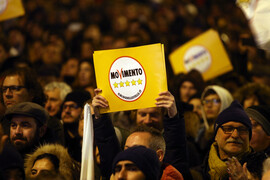Silvio Berlusconi is back at the centre of Italian politics, following a conviction for tax fraud and a public office ban. Two sets of causes may explain his return to the political arena: one “internal”, and one “external”. Before analysing these causes, a premise is essential.
Berlusconi is back because he never went away. At the end of 2011, he seemed politically spent. Three main factors led to the traumatic downfall of his fourth government, and the birth of Mario Monti’s technocratic government: the sex scandals (aka bunga bunga parties) that involved the former prime minister; the meltdown of the substantial majority in Parliament that he had won in the 2008 elections; and above all, the sovereign debt crisis. The historical period that began in 1994, and during which the Italian political system pivoted on Berlusconi, had clearly come to an end.
Yet, fifteen months later Berlusconi proved that he was still a major political player: in the 2013 general election his party won around 22% of the vote, while his coalition took almost 30%. Although he was a long way from the 38% (party) and 47% (coalition) of 2008, it was nonetheless a very significant – and unexpected – outcome. It was made even more meaningful by the disappointing electoral score of the Partito democratico (PD), which was compelled to patch together a parliamentary majority with Berlusconi’s deputies, given that the PD and Monti’s Scelta Civica were unable to form a majority.
However, during the 2013-2018 legislature, Berlusconi had to endure several judicial and political setbacks. These included a tax fraud conviction in August 2013, and a community service sentence following his conviction; the subsequent exclusion from the Senate in November 2013, as well as a ban from public office until 2019; a split in his party; and the emergence of two new, much younger, political leaders both to his right and his left, Matteo Salvini and Matteo Renzi respectively. Finally, in June 2016 he suffered a stroke and had to undergo heart surgery. In sum, since the end of 2013 Berlusconi has remained outside of the governing majority, with his party plummeting to an all-time low of 10% in the polls.
Clearly he has had many ups and downs. And yet, Berlusconi has never stopped playing a role in Italian politics. How can we explain this?
The “internal” causes. For one, Berlusconi is very tough indeed. His vitality is unique. He also thinks very highly of himself. Although I am neither his psychoanalyst nor a personal acquaintance, it seems clear that he dreads death and loathes decay, considering also how he looks after his body and loves to surround himself with otheryounger bodies. We do not need to call upon Elias Canetti to acknowledge the fact that those who seek and wield power do so also in order to survive. In the case of Berlusconi, this desire to survive is enhanced by his yearning for rehabilitation: in fact, he deems his conviction and decadence from the Senate unfair and humiliating, and seeks reparation.
The internal causes of Berlusconi’s political survival are not merely psychological, though. The man is extremely wealthy: he owns three TV channels, and he needs political power to defend his business interests. Moreover, his party – Forza Italia – belongs to him, and according to the polls, about 6 to 7 percent of Italian voters are personally committed to him. Not an enormity, but no irrelevant percentage either: a fair starting point, especially in a fragmented political system that is ruled by a proportional electoral system.
The “external” causes. The second set of causes that explains Berlusconi’s return to Italian politics regards his adversaries. Indeed, his resilience would have been to no avail, had his competitors not been so mediocre.
After the downfall of Berlusconi’s last government, in November 2011, the leaders of the Partito democratico failed to understand that a phase of Italian political history had come to an end. Having thrived on anti-Berlusconism for years, they now discovered that this weapon was blunted by Berlusconi’s displacement from the political centre. Moreover, the conflict between the tycoon and his adversaries had channelled the stream of antipolitics, which had traversed the Italian public sphere since the end of the so-called First Republic in 1992-93, into political embankments. Once that conflict lost its relevance, antipolitics could flow free, making for the electoral success of the Movimento 5 Stelle in 2013. The surge in antipolitics, and the Partito democratico’s own inability to understand what was going on, account both for the PD’s failure in the 2013 elections and for Berlusconi’s unexpected non-defeat – let alone his disappearance. Indeed, none other than Berlusconi managed to get through to the majority of his former voters: neither the limp and ideologically dusty PD, nor the icy and technocraticarrogant Scelta Civica, nor the chaotic and ambiguous Movimento 5 Stelle.
The following year, however, proved a very difficult, perhaps the worst, political year for Berlusconi. First, Matteo Renzi was elected secretary general of the Partito democratico: his mission was to modernise the PD and help it both survive the end of anti-Berlusconism and fend off the offensive of the Movimento 5 Stelle. Next, Renzi became President of the Council of Ministers, and in May 2014 he won 40% at the European elections. It seemed that the Italian political system had found the pivot that it had lost in 2011. To the right, the Lega Nord (now called simply Lega) – led by Matteo Salvini – jumped up in the polls, passing from 4 to 13 percent, thus surpassing Berlusconi’s Forza Italia. A young new leader to the left was thus matched by a young new leader to the right. Berlusconi seemed hopelessly old.
For different reasons, though, neither Renzi nor Salvini were able to consolidate their positions. Salvini grew in the polls thanks to an aggressive, Le Pen-style, anti-migration and anti-European rhetoric. His radicalism allowed him to gain consensus, but at the same time it undermined the possibility of any wider consensus being reached. Emmanuel Macron’s clear victory over Marine Le Pen in France may also have had an impact on this reaction to Salvini’s rhetoric. The story of Renzi’s failure, on the other hand, is more complicated and interesting. Although it has not yet been fully explored, this is however not the place to even attempt an explanation. Be what it may, Renzi’s defeat in the constitutional referendum of December 2016 clearly demonstrates that he could not replace Berlusconi in the politically pivotal role that the latter played between 1994 and 2011. The referendum made Renzi look politically decrepit, and at the same time, rejuvenated Berlusconi.
So how on earth can Berlusconi be back? First, Berlusconi was tough enough to survive the slings and arrows of outrageous fortune. Second, in the coming elections Italians will have to choose among options that many of them, for different reasons, dislike. Grasso’s Liberi e Uguali is too far to the left for most Italian voters; Salvini’s Lega is too much to the right; the Movimento 5 Stelle lacks experience, is ambiguous in its programme and opaque in its organisation; Renzi’s Partito democratico, finally, is led by a man who has had his go and, according to many, failed. In this company Berlusconi, albeit undesirable, may seem to many the least undesirable.

Riproduzione riservata




